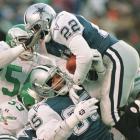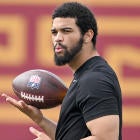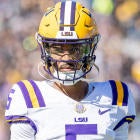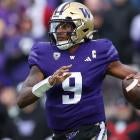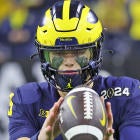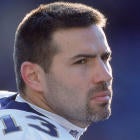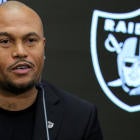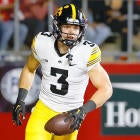
Some rivalries take a while to get going, while others start fast before fading into the past. Few rivalries start strong and never cease to lose that intensity and passion, but this is the space where the Cowboys-Eagles rivalry lies, as it has been a good one since its first matchup more than 60 years ago. The spirit of the rivalry has lived on ahead of this Sunday night, when the two bitter NFC East division rivals will square off in a game to decide first place in the NFC East.
As expected, both teams are in the running to earn the NFC's No. 1 that comes with a coveted playoff bye. Philadelphia is a conference-best 10-2, but is coming off a blowout loss to the 49ers. The loss closed the gap between Philadelphia and Dallas, which improved to 9-3 last week after edging the Seahawks, 41-35.
Before Sunday's game, here's a look at the 10 most memorable moments in the Cowboys-Eagles rivalry.
10. Eagles edge Cowboys in first meeting
The Eagles' existence began in 1933, the same year as the Pittsburgh Pirates (later renamed Steelers) and now-defunct Cincinnati Reds (which became the St. Louis Gunners before ceasing operations after the 1934 season). The franchise blossomed into the NFL's best team following World War II, as the Eagles, led by Hall of Fame running back Steve Van Buren and Hall of Fame defensive end Pete Pihos, lost the 1947 NFL Championship Game before capturing consecutive league titles the following two seasons.
After a promising 1959 season, Philadelphia was gearing up for another championship run in 1960. The Eagles' roster was flooded with talent that included Hall of Famers in quarterback Norm Van Brocklin, receiver Tommy McDonald and center/linebacker Chuck Bednarik. Philadelphia's roster that season also included Pro Bowlers in end Pete Retzlaff, kicker/tight end Bobby Watson, linebacker Maxie Baughan, and cornerback Tom Brookshier,
The Cowboys, an expansion team, were led by Tom Landry, a former Pro Bowl cornerback for the New York Giants who then served as the team's defensive coordinator from 1954-59. Landry accepted the Cowboys' head coaching position after falling to Johnny Unitas and the Baltimore Colts in consecutive NFL Championship Games that included the epic '58 title game, the first game in NFL history that was decided in overtime.
After falling to the Steelers in a hard-fought game in Week 1, the Cowboys weren't expected to give the Eagles much of a fight in Week 2. But despite being heavily out-matched, Dallas, which trailed 13-6 at intermission, made it a one-point game in the third quarter on a 75-yard touchdown pass from Eddie LeBaron to Frank Clark. Clark's touchdown set the stage for a prolific fourth quarter, as each team scored two touchdowns that included Gene Babb's 27-yard pass from LeBaron that cut the Cowboys' deficit to two points.
Unfortunately for the Cowboys, that would stand as the game's final score, as the Eagles held on for a 27-25 victory. After forcing the Eagles to settle for field goals twice in the first half, the Cowboys' defense was unable to mimic that success in the second half, with Eagles halfback Billy Ray Barnes scoring both of Philadelphia's fourth quarter touchdowns. Fellow halfback Clarence Peaks led both teams with 68 rushing yards, while McDonald's 16-yard touchdown catch in the second quarter would be his only catch of the game.
While the Cowboys would not win a game that season (finishing 0-11-1 in Landry's first season on the sideline), the Eagles would win their third NFL title after defeating Vince Lombardi and the defending champion Packers in the league championship game.
No. 52: 1960 @Eagles #FlyEaglesFly
— NFL (@NFL) November 9, 2019
📺: #NFL100 Greatest Teams on @NFLNetwork pic.twitter.com/xejk9BsyFK
It would be the Eagle's final championship of the 20th century, while Landry's Cowboys eventually blossomed into one of pro football's dominant teams.
9. Cowboys get long-awaited first victory over the Eagles
Landry's Cowboys would go onto lose their first three games against the Eagles, including both of their games against Philadelphia in 1961 by a combined score of 78-20. The Cowboys weren't having much success against the rest of the NFL, either, winning just four games during the '61 season after not winning a single game during the franchise's inaugural season.
The Cowboys' fortunes started to turn in 1962. After tying the Redskins in Week, 1 Dallas lost another hard-fought game to the Steelers before defeating the Rams in Week 3. After losing a competitive game in Cleveland to the mighty Cleveland Browns, Dallas was feeling good about its prospects of finally beating the Eagles heading into their Week 4 matchup. The Eagles, conversely, were not feeling as good after starting the season with three losses after failing to successfully defend their league title the previous year.
Similar to their first matchup, the Cowboys' defense held the Eagles to field goals on their initial scoring drives. Dallas also received another stellar outing from Frank Clarke, who gave the Cowboys a 17-6 lead on an eight-yard touchdown catch in the second quarter. Before the Eagles could catch their breath, Clarke found the end zone again, catching a 57-yard touchdown pass from quarterback Don Meredith that gave the Cowboys an insurmountable 24-6 lead in the third quarter.
After an Eagles' touchdown made it a 15-point game at the start of the fourth quarter, the Cowboys extinguished any hopes of a Philadelphia comeback when Amos Marsh ran the ensuing kickoff back 101 yards to put the Cowboys ahead 34-12. The Eagles' scored again before Mike Gaechter's 100-yard interception return put the Cowboys' first-ever victory over Philadelphia on ice.
Philadelphia never recovered from their slow start, as they finished the '62 season with just three wins in what would be the first of four consecutive losing seasons. And while the Cowboys would finish one just game ahead of the Eagles in the standings that season, the seeds of their future championship success were just beginning to grow, led by "Mr. Cowboys": defensive tackle Bob Lilly and Meredith, the Cowboys' first superstar quarterback.
No. 17: @DallasCowboys QB Don Meredith: “The original Dallas Cowboy”
— NFL (@NFL) October 19, 2019
📺: #NFL100 Greatest Characters on @NFLNetwork pic.twitter.com/x1RMR4XYUZ
8. '79 Eagles snap eight-game losing skid vs. Cowboys
While the Eagles posted just one winning season from 1962-1977, the Cowboys had become a juggernaut, winning nine division titles, four NFC championships and two Super Bowl titles during that same span. Dallas had also dominated its matchups with Philadelphia. The Cowboys won 11 straight games over the Eagles from 1967-72 before winning eight straight games in the rivalry from 1974-78.
The Cowboys of that era were loaded with talent that included Hall of Famers in quarterback Roger Staubach, receivers Lance Allworth and Bob Hayes, tight end Mike Ditka, running back Tony Dorsett, cornerbacks Herb Adderley and Mel Renfro, and defensive tackle Bob Lilly and Randy "The Manster" White. The Cowboys of that era also included Pro Bowlers in receiver Drew Pearson, running backs Calvin Hill and Duane Thomas, fullback Walt Garrison, tight end Billy Joe Dupree, defensive linemen Ed "Too Tall" Jones and Harvey Martin, linebacker Thomas "Hollywood" Henderson, defensive backs Charlie Waters and Cliff Harris, and offensive linemen Tom Fitzgerald, Tom Rafferty and Pat Donovan. If not for a slew of turnovers in Super Bowl V and four-point losses to the Steelers in Super Bowls X and XIII, the Cowboys could have become the first team in NFL history to win five Super Bowls.
In 1976, the Eagles' road back to the top of the NFL landscape began with the hiring of Dick Vermeil, a 39-year-old, first-time NFL head coach who had just led UCLA to a Rose Bowl victory over Ohio State and legendary coach Woody Hayes. After winning just nine games during his first two seasons, Vermeil appeared to be on borrowed time in Philadelphia after the Eagles dropped their first two games of the 1978 season. But after defeating the Saints in a close game, the Eagles caught fire, winning eight of their next 11 games to put themselves in the thick of the NFC playoff race. Even a Week 15 blowout loss to the Cowboys couldn't keep the Eagles out of the playoffs, with Philadelphia beating the New York Giants in their regular season finale to clinch the franchise's first winning season in 12 years.
While the Eagles had shown significant signs of improvement, not many people outside of Philadelphia considered them a serious threat to the Cowboys, who once again won the division in '78 before narrowly losing to the Steelers in Super Bowl XIII. The Eagles, if they wanted to one day be considered a legitimate Super Bowl contender, needed to beat the Cowboys while taking the upper hand in the rivalry.
The Cowboys, despite a loss Week 9 loss in their Super Bowl rematch against the Steelers, started off the '79 season with eight wins in their first 10 games entering their Week 11 matchup against the Eagles in Dallas that would be played in front of the nation on "Monday Night Football." While not bad, the Eagles' start to the '79 season wasn't nearly as strong, as Philadelphia headed to Texas Stadium with a 6-4 record and a three-game losing streak.
Dallas jumped on Philadelphia early, with receiver Tony Hill giving the Cowboys the lead on a 48-yard touchdown pass from Staubach. Nobody could have predicted what would happen next, as the Eagles scored the game's next 24 points to take a commanding lead. Receiver Harold Carmichael jumpstarted the scoring with a 32-yard touchdown reception from Ron Jaworski, while his 13-yard touchdown catch in the third quarter gave the Eagles' a 17-point cushion.
After Staubach touchdown passes to Hill and Dupree in the fourth quarter cut Dallas' deficit to three points, the Eagles turned to running back Wilbert Montgomery, whose 37-yard touchdown run clinched the game while ending Philadelphia's eight-game losing streak over the Cowboys.
11.12.1979: MNF Philadelphia Eagles stun the Dallas Cowboys 31-21 at Texas Stadium. first win in Dallas since 1965. The game swung in Philadelphia’s favor late in the second quarter, when they scored ten points in 46 seconds, including a 59-yard field goal by Tony Franklin. pic.twitter.com/nsOlWgnKdR
— Timothy C. Kulla (@TCKooo) November 12, 2019
The win helped spearhead a successful second half of the season for the Eagles, who finished the '79 season with an 11-5 record before winning their first postseason game since their win over the Packers in the '61 Championship Game. The Cowboys would bow out to the eventual NFC champion Rams in the first round in what would be the final game of Staubach's legendary career.
One team's run was nearing its end, while another team's run was just around the corner.
7. The "Pickle Juice" Game
While the Cowboys-Eagles rivalry was essentially even during the 1980s, the Cowboys won 14 of the 22 matchups between the two teams during the 1990s while becoming the NFL's Team of the Decade in the process. The Eagles had their moments, particularly during the early '90s, but Philadelphia was unable to get past divisional foes Washington, New York and Dallas, who combined to win five championships during the decade.
After dominating the first half of the decade, the Cowboys' armor began to show cracks after owner Jerry Jones parted ways with head coach Jimmy Johnson after Dallas won its second straight Super Bowl following the 1993 season. Johnson's absence, along with subpar drafting, opened the door for the 49ers to temporarily dethrone Dallas as champion in 1994 before the Cowboys rallied for one final championship run in 1995. While the Cowboys' dynasty was on fumes entering the new millennium, the Eagles -- after acquiring had coach Andy Reid and quarterback Donovan McNabb in 1999 -- were about to go on one of the most successful runs in franchise history.
The 2000s Eagles run began with a bizarre season-opener in a sweltering Texas Stadium. With temperatures at about 105 degrees, Reid famously gave his players pickle juice to help them cope with the sweltering heat. He then set the tone for the game with an onside kick on the opening kickoff. The Eagles recovered the kick and never looked back, dismantling the Cowboys 41-14 behind Duce Staley's 201 rushing yards and a Philadelphia defense that held Dallas to a putrid 167 total yards.
This week's Old School All-22 breaks down a big Duce Staley run from the Pickle Juice Game against the Cowboys in 2000.#FlyEaglesFly pic.twitter.com/41aZb4hTF1
— Philadelphia Eagles (@Eagles) December 6, 2018
The game was a passing of the torch of sorts in the NFC East; the Eagles would win 11 games and advance to the divisional round of the playoffs, while the Cowboys suffered their first of three consecutive 5-11 seasons.
6. Cowboys exact revenge on Eagles during final championship run
Many fans and media members were down on the Cowboys entering the 1995 playoffs. Despite a 12-4 regular season and fourth straight division title, constant drama, inconsistent play and an ugly Week 15 loss in Philadelphia (we'll get to that later) had many prognosticators picking the defending champion 49ers to come out of the NFL while representing the conference in Super Bowl XXX.
Dallas, however, was not yet ready to give up the crown. Against the Eagles in the divisional round of the NFC playoffs, the Cowboys' defense -- led by Hall of Fame pass rusher Charles Haley and perennial Pro Bowl safety Darren Woodson -- held the Eagles' offense to just 11 points a week after Philadelphia put up 11 points in their wild card win over the Lions. While Dallas' defense held quarterback Randall Cunningham, running back Ricky Watters in check, the Cowboys' offense received a surprising performance from receiver Kevin Williams, who caught all six of his targets for 124 yards while helping lead the Cowboys to a 30-11 victory.

Emmitt Smith complemented Williams' efforts with 99 yards and a touchdown on the ground, as Dallas would then defeat Green Bay and Pittsburgh to become the first franchise in NFL history to win three Super Bowls in a four-year span.
5. Eagles rout T.O., Cowboys to clinch playoff spot
While he is always be celebrated in Philadelphia for playing in -- and dominating -- Super Bowl XXXIX on one good leg, Terrell Owens was a somewhat controversial figure upon joining the Cowboys after being released by the Eagles during the 2005 season. Owens, who was especially candid about his fallout from Philadelphia in his 2005 autobiography, was particularly critical of his former quarterback, Donovan McNabb. Owens, in so many words, said McNabb essentially ran him out of town while also saying that McNabb ran out of gas during the end of Philadelphia's Super Bowl loss to the Patriots.
Owens joining the Cowboys certainly added to the tension that existed between the two franchises at that particular time. While the Eagles were desperately trying to keep their championship window open, the Cowboys also had championship aspirations after winning 13 games the previous season.
The defending Super Bowl champion Giants ran away with the division, but the Eagles and Cowboys faced off in Week 17 in a game that would determine which team would make the playoffs as a wild card team. Both teams entered the game looking to atone for disappointing Week 16 losses. The Cowboys were coming off a home loss to the Ravens, while the Eagles were coming off an embarrassing 10-3 loss to the Redskins.
After both teams traded first quarter field goals, 24 second-quarter points by the Eagles essentially ended the game before halftime. McNabb was on fire, rushing for the Eagles' first score of the quarter before firing touchdown passes to Correll Buckhalter and Brent Celek. David Akers' 50-yard field goal on the final play of the half set the Philadelphia crowd into a frenzied pitch that carried over into the second half.
Philadelphia's defense, fourth in the NFL in fewest points allowed that season, continued the onslaught in the third quarter, with Chris Clemons and Joselio Hanson each turning Cowboys' fumbles into touchdowns.
In the final game of the regular season in 2008, the Eagles destroyed the Cowboys 44-6 to get into the playoffs. Dawkins had a strip sack on Tony Romo that was returned by Chris Clemons for a TD. pic.twitter.com/b3dQ0BcMOQ
— Tom Ignudo (@TomIgnudo) August 4, 2018
The Eagles' 44-6 victory (Philly's largest margin of victory over the Cowboys) not only knocked Owens and the Cowboys out the playoffs, it spearheaded the Eagles' final NFC championship game run during the Reid-McNabb era.
4. Cowboys get revenge while ending long playoff drought
The Cowboys had a different look when they entered the 2009 season. In a classic "addition by subtraction" transaction, the Cowboys released Owens while making Myles Austin their No. 1 receiver. Despite the loss of Owens, the Cowboys won 11 regular season games (two more than the previous season) that included a season sweep of the Eagles, who also won 11 games in what would be McNabb's final season as the Eagles' starting quarterback.
After getting blanked by the Cowboys in Dallas in Week 17 (a game that ultimately determined the NFC East champion), the Eagles were unable to hang with Dallas in the first round of the NFC playoffs. After Michael Vick (who played in spirts that season) tied the score on a first quarter touchdown pass to Jeremy Maclin, the Cowboys went onto score 20 unanswered points in the second quarter to take a commanding 27-7 halftime lead. Running back Felix Jones put the game to bed in the third quarter, as his 73-yard touchdown run made the score 34-7.
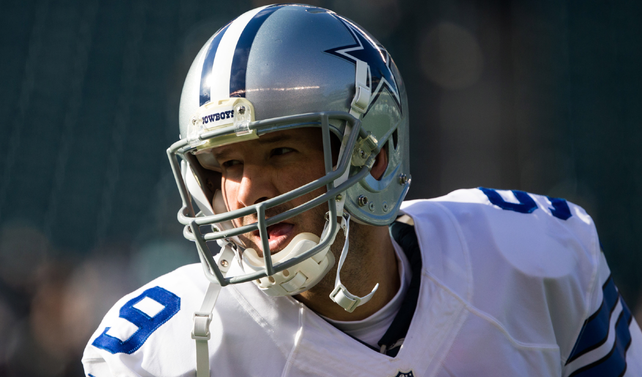
While the Cowboys' defense shut down the Eagles' offensive trio of McNabb (230 yards on 19-of-37 passing), running back LeSean McCoy (six touches for 33 yards) and receiver DeSean Jackson (three catches for 14 yards), Dallas quarterback Tony Romo enjoyed a stellar game, completing 65.7 percent of his passes with two touchdowns and no picks. Jones rumbled for 148 yards, as the Cowboys won their first playoff game since defeating the Steelers 14 years earlier in Super Bowl XXX. It was also the end of McNabb's run in Philadelphia, with the Eagles parting with their longtime quarterback during the offseason.
3. Cowboys get their first playoff win over Eagles en route to first Super Bowl win during the 1990s
Though the 1980s as a whole was a mostly even duel between the Cowboys and Eagles, Philadelphia took control of the rivalry shortly after Buddy Ryan became the Eagles' head coach in 1986. The Eagles won eight straight games in the series from 1987-91, as Philadelphia made three straight playoff appearances from 1988-90 while the Cowboys won just 11 games over that span as the team from transitioning from Tom Landry to Jimmy Johnson.
Despite their regular season success, the Eagles' fired Ryan after Philadelphia fell to Washington in the first round of the 1990 playoffs, the Eagles' third consecutive playoff loss under the defensive mastermind. Philadelphia missed the playoffs during Rich Kotite's first season at the helm (despite a 10-6 regular season record), but the '91 Cowboys won 11 regular season games as well as recording the franchise's first playoff win in nearly a decade. After winning just one game during his first season as head coach, Johnson's Cowboys enjoyed an abrupt turnaround after making the most of a historic trade that sent star running back Herschel Walker to the Vikings in exchange for a bevy of picks that Dallas would use to build its dynasty.
Despite splitting their season series against the Cowboys during the regular season, the Eagles were no match for the Cowboys when the two teams faced off in the divisional round of the 1992 playoffs. The Cowboys' offense enjoyed another sterling performance from The Triplets, but the real story of this game was the performance of Dallas' defense, a unit that was determined to make a name for itself after not getting a single defensive player voted into that year's Pro Bowl despite finishing first in the league in total defense.
Dallas' defense, quite simply, was dominant that day. Led by Charles Haley, Darren Woodson, linebacker Ken Norton, linemen Leon Lett, Russell Maryland and Tony Tolbert and safety James Washington, the Cowboys' defense held the Eagles' fifth ranked scoring offense to just 12 first downs and 178 total yards in Dallas' 34-10 victory. The Cowboys would go onto defeat San Francisco and Buffalo to win the first of their three Super Bowls over a four-year span, while the Eagles would endure two non-playoff seasons before Ray Rhodes replaced Kotite following the 1994 season. The game was also legendary pass rusher Reggie White's final game in an Eagles uniform, as White signed with the Packers during the offseason in what is known as the first significant moment in the NFL's free agency era.
Happy Birthday Jay Novacek...
— Dallas Cowboys IntCl (@DCInterclub) October 24, 2018
1993...NFC Divisional playoffs...Dallas Cowboys vs Philadelphia Eagles...Troy Aikman/Jay Novacek...#dcinterclubretro #vintagefootball #retro #throwback #dallascowboys #cowboys #CowboysNation #dallascowboysnation #dallas pic.twitter.com/qjxGu12vxb
2. "The Stop"
If there is one sequence of plays that best describes the Cowboys-Eagles rivalry, it is the Cowboys' fourth-and-1 situation against the Eagles when the two teams faced off late in the 1995 season. With the game tied and the Cowboys on their own 29-yard line, Dallas head coach Barry Switzer elected to go for the first down. But after Smith was stonewalled by the Eagles' defense, the officials ruled that the two-minute warning had already come into effect before the ball was snapped. Despite the Eagles' success on the play that was whistled dead, Switzer again gave the ball to Smith, who was again stuffed at the line to scrimmage while giving the ball to the Eagles deep in Cowboys' territory. The Eagles capitalized on the short field by kicking the game-winning field goal.
#DallasWeek
— Armchair Eagles (@ArmchairEagles) November 6, 2018
Throwback to 1995 on the play known as "4th and 1". The struggling #Eagles faced a heavy Super Bowl favorite Cowboys’ team in Week 15. This epic defensive stop secured a 20-17 victory for the Birds#FlyEaglesFly | #DALvsPHI pic.twitter.com/Cb9qgv4sOR
That sequence embodied what the Cowboys-Eagles rivalry is all about: Cowboys' confidence vs. Eagles' grittiness. At this moment, the Eagles' grittiness won out on a play that continues to live in Cowboys infamy.
1. Eagles beat Cowboys in first -- and only -- NFC Championship Game showdown
The most memorable game between the two teams was the Eagles' lone playoff victory over Dallas. It was on Jan. 11, 1981, as Philadelphia was looking to defeat Dallas in the NFC Championship Game. In front of a frenzied home crowd, the Eagles, one year after snapping their nine-game losing skid against the Cowboys, defeated Dallas 20-7 en route to their first Super Bowl appearance.
After running back Wilbert Montgomery started the game with a 42-yard score, the Eagles, three weeks after losing to the Cowboys in their regular-season finale, scored 13 unanswered points in the second half. Montgomery would finish with 194 rushing yards on 26 carries, while Philadelphia's defense held Dallas to just 206 total yards while forcing four turnovers.
On this day in 1981, the #Eagles defeated the Dallas Cowboys in the NFC Championship Game.#FlyEaglesFly pic.twitter.com/f5iCyB0Csn
— Philadelphia Eagles (@Eagles) January 11, 2018
The Eagles, while trying to get under the Cowboys' skin, elected to wear their away white jerseys while forcing Dallas to wear their "bad luck" blue road jerseys as opposed to their preferred white jerseys (Dallas never again wore their bad luck blues in Super Bowls after wearing them in their first Super Bowl, a 16-13 loss to the Baltimore Colts in Super Bowl V). While the Cowboys' brass "flew into a rage" after getting the news, there was nothing they could do.
"They were very open about which colors they preferred," former Eagles coach Dick Vermeil said of Dallas' jersey preference, via the team's official website. "We thought, 'Why let them wear it?' It was just one more thing for them to think about."
Dallas' blue jerseys again proved to be unlucky and Philadelphia finally defeated their division rival in a big game.
"It's time someone gave us the credit we deserve," former tight end Keith Krepfle said. "We kicked the hell out of them."













